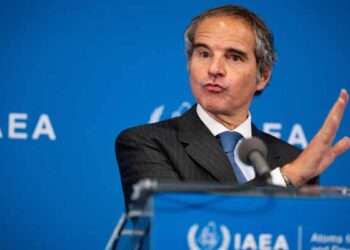Select Language:
A rally took place outside the United Nations headquarters in New York City, with participants protesting under the banner “Stop Starving Gaza Now” on July 25, 2025. — Reuters
France is revitalizing efforts toward a conference, with analysts noting it as a significant move. Currently, at least 142 of the 193 UN member states recognize a Palestinian state. No new normalization agreements are anticipated at this time, according to sources.
Next week, UN member nations will gather to renew focus on resolving the Israeli-Palestinian conflict through a two-state solution, despite Israel’s expected absence due to ongoing fighting in Gaza. This meeting follows French President Emmanuel Macron’s announcement that France will officially recognize the State of Palestine in September. According to Richard Gowan of the International Crisis Group, Macron’s statement is expected to inject new urgency into an otherwise seemingly declining conference. Other delegates may now consider recognizing Palestine themselves, shifting the diplomatic landscape.
An AFP database shows that, as of now, 142 UN countries recognize the Palestinian state declared by the Palestinian leadership in exile in 1988, including France.
In 1947, the UN General Assembly adopted a resolution partitioning Palestine—then under British mandate—into separate Jewish and Arab states. The following year, Israel was proclaimed. For decades, the overwhelming majority of UN members have supported a two-state approach, envisioning peaceful coexistence for Israelis and Palestinians. However, the conflict in Gaza, now over 21 months long, the expansion of settlements in the West Bank, and Israeli officials’ talk of annexation threaten the feasibility of creating a viable Palestinian state.
The recent burst of conflict originated from a Hamas attack on Israel, prompting a large-scale military response that has resulted in thousands of Palestinian deaths. The upcoming UN conference is a response to the crisis, with Palestinian Prime Minister Mohammad Mustafa and numerous international ministers expected to attend.
This gathering presents an unprecedented chance to reshape international law and consensus, with a focus on formal recognition of Palestine, reform of the Palestinian Authority, disarmament of Hamas, and normalization of relations between Arab states and Israel—although no normalization deals are expected to be announced at this time. Britain has declared it will wait for a broader peace plan before recognizing Palestinian statehood, and Germany has not yet been convinced to follow suit.
Palestinian envoy Riyad Mansour stated the meeting could be a historic turning point to end decades of occupation and conflict, urging participants to show courage. The United States and Israel will not participate; Israel’s UN ambassador, Danny Danon, cited unresolved issues like Hamas’s designation and hostage recovery as reasons for their absence.
Throughout the conference, speeches from over 100 countries are expected to highlight the humanitarian crisis in Gaza, with many likely to criticize Israel’s military actions. International pressure continues to mount for a resolution to the prolonged conflict.






